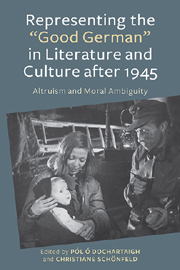Book contents
- Frontmatter
- Contents
- List of Illustrations
- Acknowledgments
- Introduction: Finding the “Good German”
- 1 Re-Presenting the Good German: Philosophical Reflections
- 2 “Görings glorreichste Günstlinge”: The Portrayal of Wilhelm Furtwängler and Gustaf Gründgens as Good Germans in the West German Media since 1945
- 3 From Hitler's Champion to German of the Century: On the Representation and Reinvention of Max Schmeling
- 4 Wilhelm Krützfeld and Other “Good” Constables in Police Station 16 in Hackescher Markt, Berlin
- 5 The “Good German” between Silence and Artistic Deconstruction of an Inhumane World: Johannes Bobrowski's “Mäusefest” and “Der Tänzer Malige”
- 6 Saints and Sinners: The Good German and Her Others in Heinrich Böll's Gruppenbild mit Dame
- 7 Being Human: Good Germans in Postwar German Film
- 8 “The Banality of Good”? Good Nazis in Contemporary German Film
- 9 Memories of Good and Evil in Sophie Scholl — Die letzten Tage
- 10 Deconstructing the “Good German” in French Best Sellers Published in the Aftermath of the Second World War
- 11 Macbeth, Not Henry V: Shakespearean Allegory in the Construction of Vercors's “Good German”
- 12 A Good Irish German: In Praise of Hugo Hamilton's Mother
- 13 Shades of Gray: The Beginnings of the Postwar Moral Compromise in Joseph Kanon's The Good German
- Works Cited
- Filmography
- Notes on the Contributors
- Index
7 - Being Human: Good Germans in Postwar German Film
Published online by Cambridge University Press: 05 June 2013
- Frontmatter
- Contents
- List of Illustrations
- Acknowledgments
- Introduction: Finding the “Good German”
- 1 Re-Presenting the Good German: Philosophical Reflections
- 2 “Görings glorreichste Günstlinge”: The Portrayal of Wilhelm Furtwängler and Gustaf Gründgens as Good Germans in the West German Media since 1945
- 3 From Hitler's Champion to German of the Century: On the Representation and Reinvention of Max Schmeling
- 4 Wilhelm Krützfeld and Other “Good” Constables in Police Station 16 in Hackescher Markt, Berlin
- 5 The “Good German” between Silence and Artistic Deconstruction of an Inhumane World: Johannes Bobrowski's “Mäusefest” and “Der Tänzer Malige”
- 6 Saints and Sinners: The Good German and Her Others in Heinrich Böll's Gruppenbild mit Dame
- 7 Being Human: Good Germans in Postwar German Film
- 8 “The Banality of Good”? Good Nazis in Contemporary German Film
- 9 Memories of Good and Evil in Sophie Scholl — Die letzten Tage
- 10 Deconstructing the “Good German” in French Best Sellers Published in the Aftermath of the Second World War
- 11 Macbeth, Not Henry V: Shakespearean Allegory in the Construction of Vercors's “Good German”
- 12 A Good Irish German: In Praise of Hugo Hamilton's Mother
- 13 Shades of Gray: The Beginnings of the Postwar Moral Compromise in Joseph Kanon's The Good German
- Works Cited
- Filmography
- Notes on the Contributors
- Index
Summary
If justice perishes, human life on earth has lost its meaning.
— Immanuel KantAnd you shall unearth love underneath the rubble of hatred.
— Ernst WiechertThe focus of this chapter is on the cinematic representation of the “good German” in the immediate aftermath of the Second World War, and the reorientation of defeated, isolated, and morally devastated Germans, not only by addressing the country's all-too-recent genocidal past, but especially by highlighting the possibility of moral truth, autonomous agency, and ethical action, and thereby, the possibility of a better future. Representations of humanity, decency, and the courage to disobey or change were projected during this early postwar period onto often makeshift cinema screens as seeds lying dormant under thousands of cubic feet of rubble. Provided with the fertile ground of honesty and integrity, audiences in the early postwar era were encouraged to believe that a community and a value system based on equality and human dignity could once again take root.
With the end of the hitherto unimaginably destructive war, with “Hitler dead but nonetheless requiring repeated exorcism” as Jaimey Fisher puts it in his recent study of the representation of youth in re-education and reconstruction processes in Germany after 1945, film became an important representational tool. Screenings of both documentary and fiction films were intended to rouse and educate passive audiences and to encourage reflection regarding the individual's vital role in the reconstruction of the German imagined community.
- Type
- Chapter
- Information
- Representing the "Good German" in Literature and Culture after 1945Altruism and Moral Ambiguity, pp. 111 - 137Publisher: Boydell & BrewerPrint publication year: 2013



